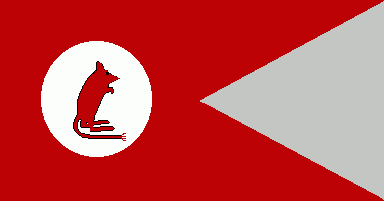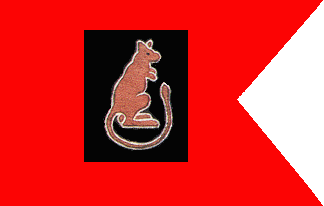
FOTW beschäftigt sich mit der Wissenschaft der Vexillologie (Flaggenkunde).
Alle auf dieser Website dargebotenen Abbildungen dienen ausschließlich der Informationsvermittlung im Sinne der Flaggenkunde.
Wir distanziert uns ausdrücklich von allen hierauf dargestellten Symbolen verfassungsfeindlicher Organisationen.
Last modified: 2019-08-06 by rob raeside
Keywords: desert rats |
Links: FOTW homepage |
search |
disclaimer and copyright |
write us |
mirrors
 by Edward Mooney, 10 January 2001
by Edward Mooney, 10 January 2001
A neighbor of mine when I was a kid used to tell me stories about fighting with the British 7th in North Africa in WWII. He had the flag (pennant?) attached hanging in his garage. I found this image in the Eyewitness Series Book by Knopf entitled "FLAG" [cra89g], and it matched my memory of the flag I saw years ago.
Edward Mooney, 10 January 2001
See also:
The standard identifying symbol of a British division in WW2 was a red swallow-tail flag. Individual divisions mounted their formation sign on this flag. Brigades which had fought with the 7th Armoured Division in the North African desert and subsequently became independent took with them the jerboa symbol. The 4th Armoured Brigade had a black jerboa on a white square. The 7th Armoured Brigade, which went to Burma and called themselves the "jungle rats", had a green jerboa in a red circlet on a white background.
Attached is an approximation of the 7th Armoured Division flag at the end of WW2, based on photographs of other divisional flags and photographs of the 7th's formation sign.
T.F. Mills, 10 January 2001
It was on a red oblong not square and originally worn on the Topee ( I still
have mine) not on the top of the sleeve, that came much later.
Ernie Huntley, 6 December 2002
 by Todd Mills, 10 January 2001
by Todd Mills, 10 January 2001
The 7th Armoured Division Formation Sign was a red jerboa in a white circle on red square.
Later it was a brown jerboa fimbriated white on black.
David Prothero, 10 January 2001
The black-red-black horizontally-striped British army flag designated an army headquarters. The jerboa was a divisional symbol in Montgomery's army.
Jack Kowalski 10 January 2001
The term Desert Rat was given to the British 8th Army under the command of
General Montgomery and derives from the Jerboa, a largely nocturnal rodent
native to North Africa that hops like a Kangaroo. Soldiers of the 8th Army never
actually wore a desert rat insignia in North Africa.
The 4th Armoured Brigade, formed after Munich in Egypt in 1938, lays claim to
the original desert rat name.
The 7th Armoured Division preceded the 4th Armoured Brigade back to England in
preparation for the Second Front Normandy Landings.
The 4th Armoured Brigade left N. Africa to join the Italian campaign before
returning for the Second Front after fighting the battle on the river Sangro,on
Italy’s Adriatic coast.
The 4th Armoured Brigade arrived back in England to find that the 7th Armoured
Division had already produced a badge, and so created their own caricatured
version.
NB. A division comprises 2 or more Brigades, the 4th became an independent
Brigade.
Wing Commander PM Gosse MC(Retd), 7 July 2002
Reference to the 4th Armoured Brigade in 1938 is an error, for I served with
the Heavy Armoured Brigade under Brig. Caunter during the Italian Campaign.
At that time the 7th Armoured Division had two armoured brigades, the Light
Armoured (L.A.B, formed mainly of the 7th Hussars) and the Heavy (H.A.B.). Later
the names were changed, the LAB became the 7th Armoured Brigade and the HAB, the
4th Armoured Bde.
E.W.H. Huntley6 December 2002
Hosted by: Fanshop-Online.de und Handy-Shop.de
Tipp: Smartphones im Shop